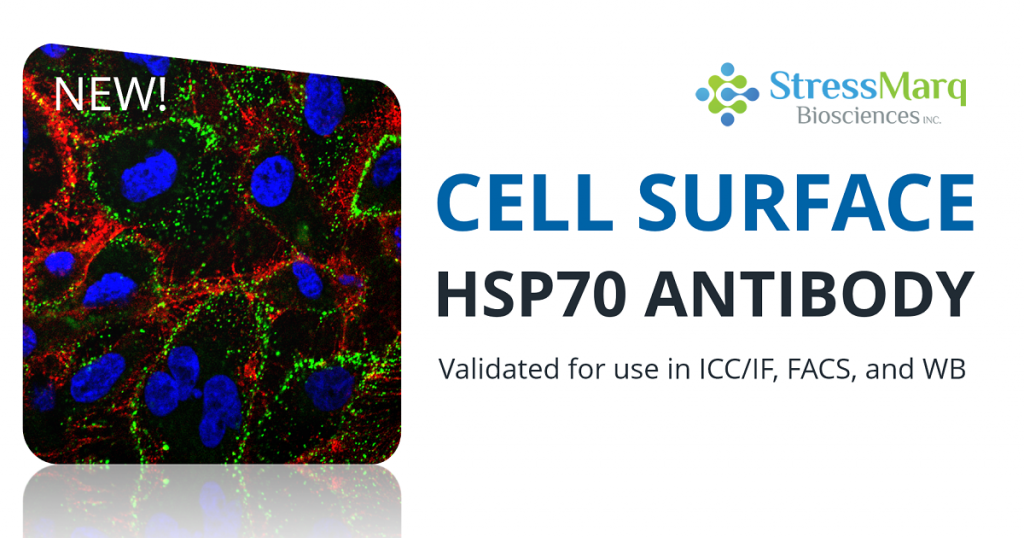New Cell Membrane HSP70 Antibody
We are excited to announce the release of a new antibody that is specific for cell membrane embedded heat shock protein 70 (HSP70).
Our anti-HSP70 antibody, clone 1H11 (Catalog #SMC-249) is unique from other commercially available antibodies in that it can bind to the extracellular region of cell membrane embedded HSP70 protein, allowing researchers to differentiate between intracellular and cell membrane embedded HSP70 across cancer cell types.
Watch our video explaining the importance of cell membrane HSP70 detection:
Cancer & Cell Membrane Embedded HSP70
HSP70 expression is increased due to environmental stressors such as heat, radiation, toxic chemicals, as well as internal stressors such as disease states.
Recent research has found that a portion of HSP70 becomes embedded in the cell membrane in tumor cells (1).
The presence of cell membrane embedded HSP70 has been found to increase the stability of cancer cells, thereby protecting tumors from environmental stress (2, 3).
HSP70 Clinical Significance
Patients whose tumor cells have tested positive for cell membrane embedded HSP70 have been shown to have significantly decreased survival rates.
Therefore, in a clinical setting, detection of cell membrane HSP70 could serve as a negative prognostic marker in cancer patients (4).
Research has shown that a side effect of chemotherapy is the upregulation of cell membrane HSP70 on tumor cells (5-8).
This upregulation of HSP70 may be conferring a protective effect on tumor cells, thereby blocking effective reduction of the tumor.
As a result, cancer researchers are exploring the use of HSP70 inhibitors as a potential cancer treatment.
Additionally, cancer researchers are looking to exploit cell membrane embedded HSP70 on tumor cells as a marker for directing tumor cell specific therapies.
Cell Membrane HSP70 Detection
As HSP70 localizes to the cell membrane of cancer cells but not normal cells, it is suggested that HSP70 undergoes a conformational change in the lower pH environment characteristic of cancer cells (7).
Current commercially available antibodies bind to intracellular HSP70, but they are unable to bind to the altered conformation of HSP70 when it is embedded in the cell membrane.
Our new cell membrane HSP70 Antibody is able to bind the altered conformation of HSP70 while embedded in the cell membrane, making it a key tool for cancer research in the life sciences.
It has also shown to bind intracellular HSP70 to a lesser extent when the cell membrane is permeabilized.
HSP70 Antibody (catalog# SMC-249) has been rigorously validated for use in western blot, flow cytometry, immunocytochemistry/immunofluorescence, and fluorescence-activated cell sorting.
Please visit the HSP70 Antibody (catalog# SMC-249) product page for validation figures and further information.
References:
- De Maio, A. (2011) Cell Stress. Chaperones. 16, 235-249.
- Horvath, I. & Vigh, L. (2010) Nature. 463, 436-438.
- Horvath, I., Multhoff, G., Sonnleitner, A., & Vigh, L. (2008) Biochim. Biophys. Acta. 1778, 1653-1664.
- Pfister,K.et al. (2007) Cancer. 110, 926-935.
- Kleinjung, T.et al. (2003) Int. J. Radiat. Oncol. Biol. Phys. 57, 820-826.
- Farkas, B.et al. (2003) Melanoma Res. 13, 147-152.
- Gehrmann, M.et al. (2005) Cell Death. Differ. 12, 38-51.
- Gehrmann, M., Radons, J., Molls, M., & Multhoff, G. (2008) Cell Stress. Chaperones. 13, 1-10.


Leave a Reply